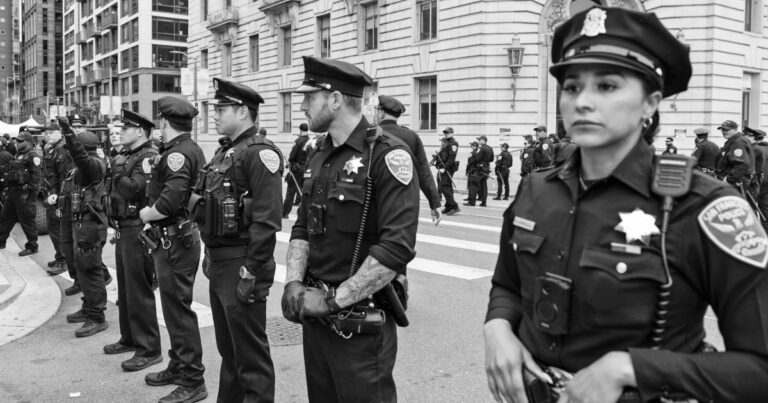A month ago, I got a call from the manager of Shalimar, the tenderloin restaurant I’ve been frequenting since I was 8 years old.
“We were broken into. Cash register. iPad. Everything was stolen.”
There was a sense of urgency in his voice. Police said they had not yet arrived and it had been several hours since they reported the incident.
I immediately called the Tenderloin station and learned that there had been a shooting at Powell Station at the same time, and all available police officers had to be sent to the scene.
Why is this? Whether it’s why 911 response times are record-setting at nearly nine minutes, why sideshows seem rampant, or why the streets seem to be full of fentanyl. It’s the same reason.
San Francisco is facing a civil servant shortage crisis. With a shortage of 500 officers, our city’s police force faces the impossible decision of deciding which residents to help when they need it most. But this is not just a crisis for law enforcement. It is a crisis for all of us as we continue to wait for help when it may be too late.
Every day that goes by without addressing this understaffing crisis, we are effectively broadcasting to criminals that our laws will not be enforced as we hand out public safety in San Francisco.
we must act. This starts with ensuring police departments are adequately staffed and patrolling neighborhoods.
The need for regular patrols is not a one-time request from Shalimar management. The evidence also speaks to this. Directed patrols of high-risk areas have been shown to significantly reduce crime. A 2020 study of 60 different crime hotspots across the United States found that deploying beat patrols reduced crime by 16%.
This highlights an important finding that is often lost in conversations about public safety. In other words, it is not the severity of punishment that deters criminals from committing crimes, but the certainty of arrest.
The impact of not addressing the staffing crisis is reflected in citywide data. According to SFPD members I interviewed, five years ago there were 30 officers on patrol at the Tenderloin station, which covers both the Tenderloin and SOMA neighborhoods. There are currently only four security guards working at the station. This means that the Tenderloin often does not have a single security guard due to a lack of resources due to the deteriorating conditions in these areas. The Tenderloin is currently seeing a 19% increase in monthly robberies compared to last year, and a 77% increase in gun violence victims since the beginning of the year.
Five years ago, the Special Victims Unit had 60 investigators, including military personnel and women, who were tasked with handling cases such as sexual assault and elder abuse, police officials said. Currently, SVU only has 24 investigators. Citywide monthly domestic violence incidents are up 6% year-over-year, and monthly assault incidents are up 3% year-over-year.
What is the root cause of the police personnel crisis? All you have to do is look at the numbers. According to law enforcement officials, 3,000 people applied to SFPD last year. Of these, historically about 1 in 10 even passes a preliminary background check. There are currently 50 new police officer candidates. While this is a marked improvement over the previous year, it is still a disaster as 60 executives are forced into retirement each year.
The issue contributing to this downward trend is not just the lack of pipeline, but the quality of the pipeline. There is a solution. Recruitment processes need to be fixed.
SFPD currently has only four full-time recruiters, according to police officials. Most of them are sworn officers. That needs to change. A relatively large budget organization with 2,000 staff in the private sector would have 20 recruiters.
Therefore, you need to do the following:
SFPD has quadrupled its recruiting staff. Rather than relying on inbound applications, corporate recruiters go outbound to identify quality candidates. They actively source candidates, make phone calls, and solicit applications. Additionally, these recruiters should be civil servants, not sworn officers. This job is more like sales than front-line policing, and we need every sworn police officer to keep our streets safe.
Think bigger and offer educational incentive programs to your executives. Consideration should be given to reimbursing SFPD personnel for their college education in exchange for a certain number of years of service, in the style of the Federal ROTC program. At a time when competition for civil service jobs is fierce nationally, this provides a path for San Francisco to lead the way in innovative civil service programs.
In the short term, San Francisco police officers will be presented with options regarding their future this November. Voters have the option of supporting Proposition F. Prop. F would encourage police officers to postpone retirement in exchange for five more years of service as patrol officers or investigators. While not perfect, Proposition F is a consensus measure supported by Supervisors Aaron Peskin and Matt Dorsey that could help retain front-line police officers in areas where they are most needed, like the Tenderloin. .
In the long term, we need to systematically rethink hiring and procedures to restore fully staffed police departments. In doing so, we will send a clear and strong message that San Francisco is not a lawless city and will not abandon those who need us most.
Bilal Mahmood is a former policy analyst in the Obama administration and technology entrepreneur. He is currently an elected member of the Democratic County Central Committee and a candidate for District 5 Supervisor.


